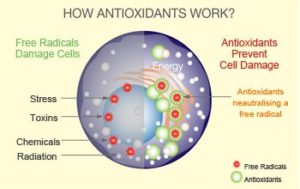A blanket rejection of the concurrent use of antioxidants with chemotherapy is not justified by the preponderance of evidence at this time and serves neither the scientific community nor cancer patients
Hi David- I just finished posting a comment in the comments section in the blog about bromelian. I know that you are not a doctor and I am not asking about medical advice, but since you also do a lot of research, I want to know your opinion on stopping the use of antioxidants (such as various vitamins) during radiation therapy.

As I delve into the topic, I am finding out that there is a lot of controversy on the subject. Part of this is probably because most supplements and vitamins are OTC and not very patent-able, so there isn’t the pharma research money to study them. Oncologists also usually want to stay on the ‘safe side’ of therapy.
I know the theory of radiation producing oxidative stress which cancer does not like, but somehow taking away the body’s ability to protect itself by denying helpful therapies seems counter intuitive.
Yes, yes, I know one can use diet to try to compensate, but one can only eat so much!
So knowing that this will just be your opinion, do tell? Supporting links would be very appreciated as well!
Thank you, Nanette
Hi Nanette,
I agree with all of your thinking/reasoning above. Yes, the issue of antioxidants DURING therapy, chemo or radiation, is controversial. Yes, Pharma and conventional oncology are on one side and the supplement industry is on the other. Oncology has to follow any recommendation/approval for any therapy based on what the FDA says. This is not a criticism, just a fact.
The studies that I have read and posted on PBC cite the short, long-term and late stage benefit of nutrition and supplementation during therapy. I will link appropriate studies below.
Also, if you are considering radiation therapy please consider hyperbaric oxygen therapy (HBOT) immediately following radiation. You may feel fine for weeks, months, sometimes years following radiation. And side effects may occur. This was the course of my Radiation-induced Lumbosacral Plexopathy.
The guide below lists a dozen or so studies on the issue.
Let me know if you have any questions.
David Emerson
- MM Survivor
- MM Cancer Coach
- Director PeopleBeatingCancer
Recommended Reading:
“… Physicians whose goal is comprehensive cancer therapy should refer their patients to qualified integrative practitioners who have such training and expertise to guide patients. A blanket rejection of the concurrent use of antioxidants with chemotherapy is not justified by the preponderance of evidence at this time and serves neither the scientific community nor cancer patients...”
“Since the 1970s, 280 peer-reviewed in vitro and in vivo studies, including 50 human studies involving 8,521 patients, 5,081 of whom were given nutrients, have consistently shown that non-prescription antioxidants and other nutrients do not interfere with therapeutic modalities for cancer. Furthermore, they enhance the killing of therapeutic modalities for cancer, decrease their side effects, and protect normal tissue. In 15 human studies, 3,738 patients who took non-prescription antioxidants and other nutrients actually had increased survival.”
“While clinical studies on the effect of anti-oxidants in modulating cancer treatment are limited in number and size, experimental studies show that antioxidant vitamins and some phytochemicals selectively induce apoptosis in cancer cells but not in normal cells and prevent angiogenesis and metastatic spread, suggesting a potential role for antioxidants as adjuvants in cancer therapy.”
“Currently, evidence is growing that antioxidants may provide some benefit when combined with certain types of chemotherapy. Because of the potential for positive benefits, a randomized controlled trial evaluating the safety and efficacy of adding antioxidants to chemotherapy in newly diagnosed ovarian cancer is underway at the University of Kansas Medical Center.”




